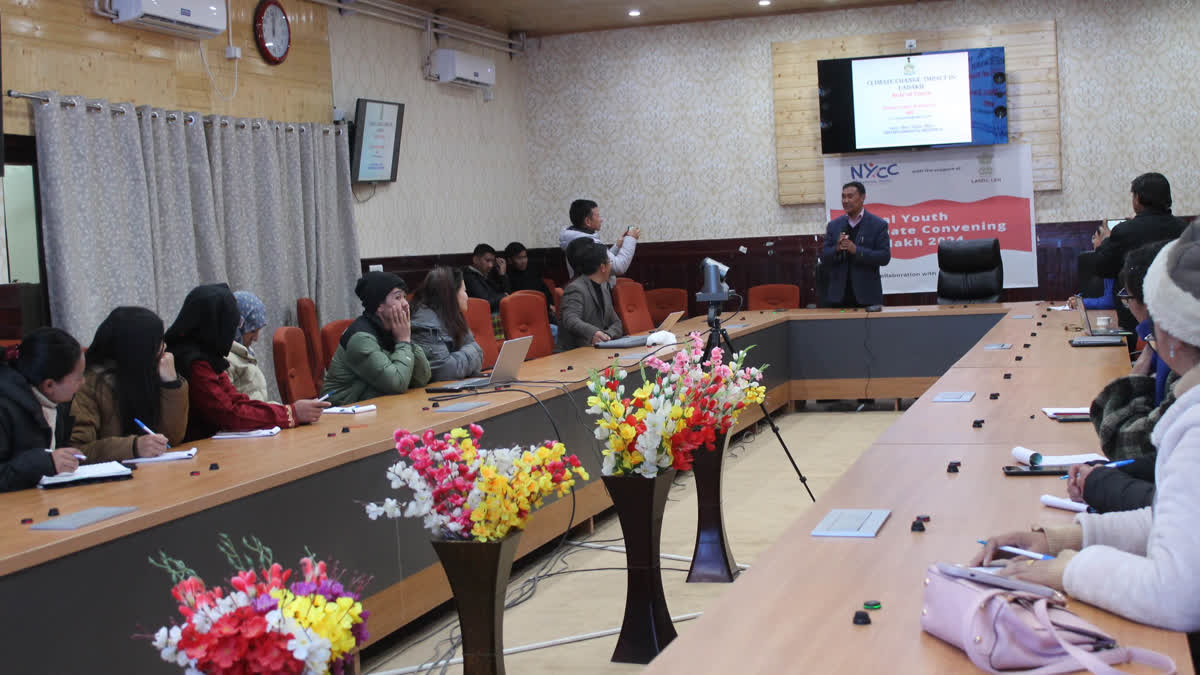Leh: Young leaders, local policymakers, and environmentalists deliberated on critical climate issues at Ladakh 2024 conference held in Leh on Monday. Topics ranged from local climate change challenges to solutions for sustainable development in the Himalayan region.
The National Youth Climate Consortium (NYCC), in collaboration with the Municipal Committee of Leh (MCL) and supported by Ladakh Autonomous Hill Development Council (LAHDC), Leh, organised the day-long event.
Highlighting Ladakh's path to carbon neutrality, Jigmet Takpa, Former Principal Chief Conservator of Forests, UT Ladakh, stressed the need for a multi-pronged, data-driven strategy. He stated, "In renewable energy, we must expand capacity from 161 MW to 25,000 MW by 2050, focusing on solar power and adding 100 MWh of energy storage. For energy efficiency, we need to reduce residential energy demand by 33%, commercial by 10%, and transport by over 30% by 2050."
Takpa further said in green transport, we must electrify vehicles, increasing electricity demand to 2 million MWh and cutting transport emissions by 47%. In sustainable agriculture, we need to reduce agricultural emissions by 30% by 2050, he said.
He continued, "By harnessing its renewable energy potential and adopting sustainable practices across all sectors, Ladakh can reach its net-zero goal and become a model for sustainable development in other regions."
Sonam Lotus, meteorologist, emphasised that mountains are the first indicators of climate change, with visible and concerning impacts in Ladakh, citing examples like Khardungla and Stok Glacier. "Climate change is a reality, and the signs are loud and clear, especially in mountainous regions like Ladakh," he said. He urged youth to take a stand against the adverse effects of climate change, drawing inspiration from Greta Thunberg. "Ladakhi youth must raise their voices to ensure policymakers take meaningful climate action," he added.
Dr. Sonam Wangchok, Founder of the Himalayan Heritage Cultural Foundation, highlighted the severe impact of climate change on Ladakh’s cultural heritage. He noted that heavy rainfall in the western Himalayas poses a grave threat to historical sites, monuments, and artifacts.
“Rainwater infiltration damages paintings, plaster, and wooden structures in monasteries, causing cracks, bulges, and deterioration,” he said. Dr. Wangchok emphasised the need for advanced research to study indoor climate impacts and develop sustainable conservation strategies. He also stressed the importance of blending scientific conservation techniques with traditional restoration practices and training young people to preserve historic Buddhist monasteries and ritual artifacts for future generations.
Ghulam Mehdi, EC of LAHDC Leh, emphasized the importance of addressing climate change.
Dr. Subrat Sharma, Dean of Research at the University of Ladakh, and Kunzang Deachen, Project Associate with Local Futures Ladakh, discussed the impact of rapid climate change and its intersection with gender, research, and youth. Dr. Stanzin Namgail, Assistant Professor, also shared insights during the event.
Earlier, Stanzin Doton, NYCC Champion, outlined the objectives of Young India’s climate initiatives, while Muskan Lodhi, Communication and Advocacy Lead for NYCC and Bring Back Green, discussed the National Youth Climate Consortium.



